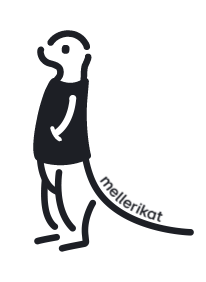DocuMentor
DocuMentor is an AI-powered intelligent document knowledge service that analyzes user intent and builds knowledge systems with Agents and tools.
When you tell us how you want to utilize your documents, SuperAgent and specialized SubAgents collaborate to build your own knowledge system with optimal cost and quality. Experience not just simple document processing, but an intelligent knowledge management solution customized for you.

Importance of User Intent Analysis
Even the same document requires different processing methods depending on the purpose of use
Typical RAG systems try to process the same document types in the same way, but in reality, completely different approaches are needed depending on the document's creation intent and usage purpose.

For example, even with the same PDF format, users have different purposes, and the priorities of information that needs to be processed importantly are different.
For scanned documents, image information extraction through OCR processing is key, while for papers, accurate preservation of professional content and reference information is important. For contracts, precise extraction of important clauses and legal information is essential, and for reports, systematic structuring of tables, images, and result-oriented information should be prioritized.
DocuMentor solves this fundamental problem by understanding the document's creation intent and the user's usage purpose and establishing the most suitable processing strategy for each document.
DocuMentor's Core Philosophy
User Intent-Centered Intelligent Knowledge System
Typically, RAG systems focus only on how to process documents and try to introduce high-cost LLM models.
Using high-cost models without purpose for knowledge utilization maintains an inefficient cost structure
where unnecessarily high costs continuously occur even for simple tasks.
DocuMentor starts not from "How should we process this document?" but from the fundamental question
"Why and how does the user want to use this document?",
and aims to present a new paradigm that builds knowledge systems by selecting customized tools and models according to user intent.
User Intent Analysis Method
DocuMentor's first step starts with understanding the user's intent.
User intent is formalized and analyzed from three perspectives: Purpose - Key Feature - Cost Effectiveness.
Purpose identifies knowledge utilization purposes such as simple Q&A, accurate information search, insight discovery, educational material generation, etc. Key Feature determines importance such as time information, content types (text/tables/images), specific entities, etc. Priority considers cost-quality trade-offs such as cost priority, quality priority, balance, etc.
User Purpose: "What do you want to do with this knowledge?"
Understanding the fundamental reason why users build knowledge systems and the ultimate goal they want to achieve. The structure and emphasis of knowledge should change according to the purpose.
→ Simple Q&A / Accurate information search / Insight discovery / Educational material generation, etc.
Key Feature: "What information do you consider important?"
This reflects that not all information in documents has the same value. It determines processing priorities by understanding what type of information users place higher weight on.
→ Time information (latest information, annual classification, etc.) / Content types (tables, images, text) / Specific information (clauses in contracts, importance of specific entities), etc.
Cost Effectiveness: "What do you consider more important, cost or quality?"
Users realistically have budget constraints. Sets the balance point between the constraint of cost and the quality of results.
→ Cost priority / Quality priority / Cost-quality balance
DocuMentor Studio
From User Intent Analysis to Knowledge System Construction
The process of analyzing user intent and building knowledge systems by combining optimal tools, which is the core value of DocuMentor service, takes place in DocuMentor Studio.
Users can upload their documents and input their intent in DocuMentor Studio, where SuperAgent and SubAgents intelligently collaborate to analyze user intent and build knowledge systems based on this analysis.
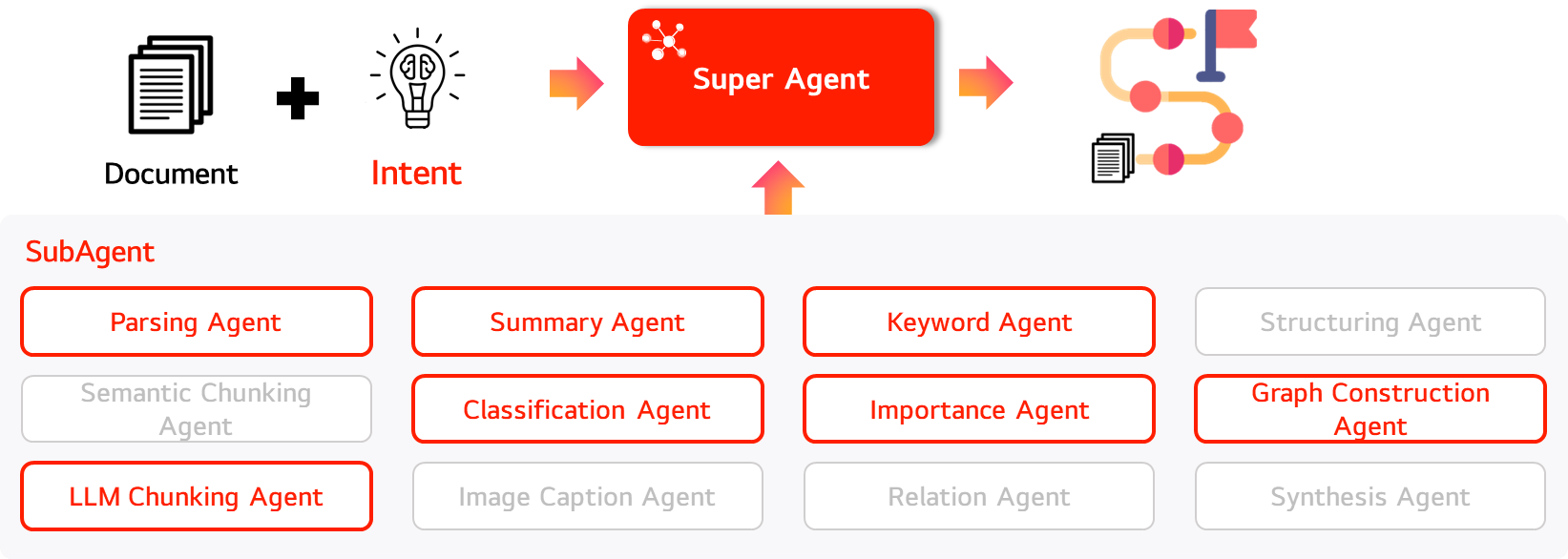
SuperAgent serves as the conductor role, analyzing user intent and establishing overall processing strategies.
It accurately understands the characteristics and capabilities of each SubAgent, determines the combination and execution order of SubAgents most suitable for user intent, and establishes optimal execution plans.
This plan transparently presents which SubAgents will be used, along with estimated time and cost for the entire task.
SubAgents are specialists who can understand what tools help with strategy formulation in their respective expert areas according to SuperAgent's strategy.
Each SubAgent possesses various tools and models optimized for their role and executes the actual knowledge processing construction work according to the strategy established by SuperAgent.
Representative SubAgent Types and Roles
Parsing Agent
Role of understanding text and structural information written in documents and extracting necessary information
Chunking Agent
Role of dividing parsed information from documents into meaningful units that LLMs can understand
Embedding Agent
Role of converting text chunks into numerical vectors that computers can semantically compare
Summary Agent
Role of summarizing long texts or extracting only necessary information by condensing required information
Keyword Extraction Agent
Role of quickly identifying key words in documents or extracting structured information from unstructured information
Classification Agent
Role of classifying documents or chunk units into specific categories for typification
SubAgent and Tools/Model Optimization
Utilizing Tools and Optimal Models for Knowledge System Construction
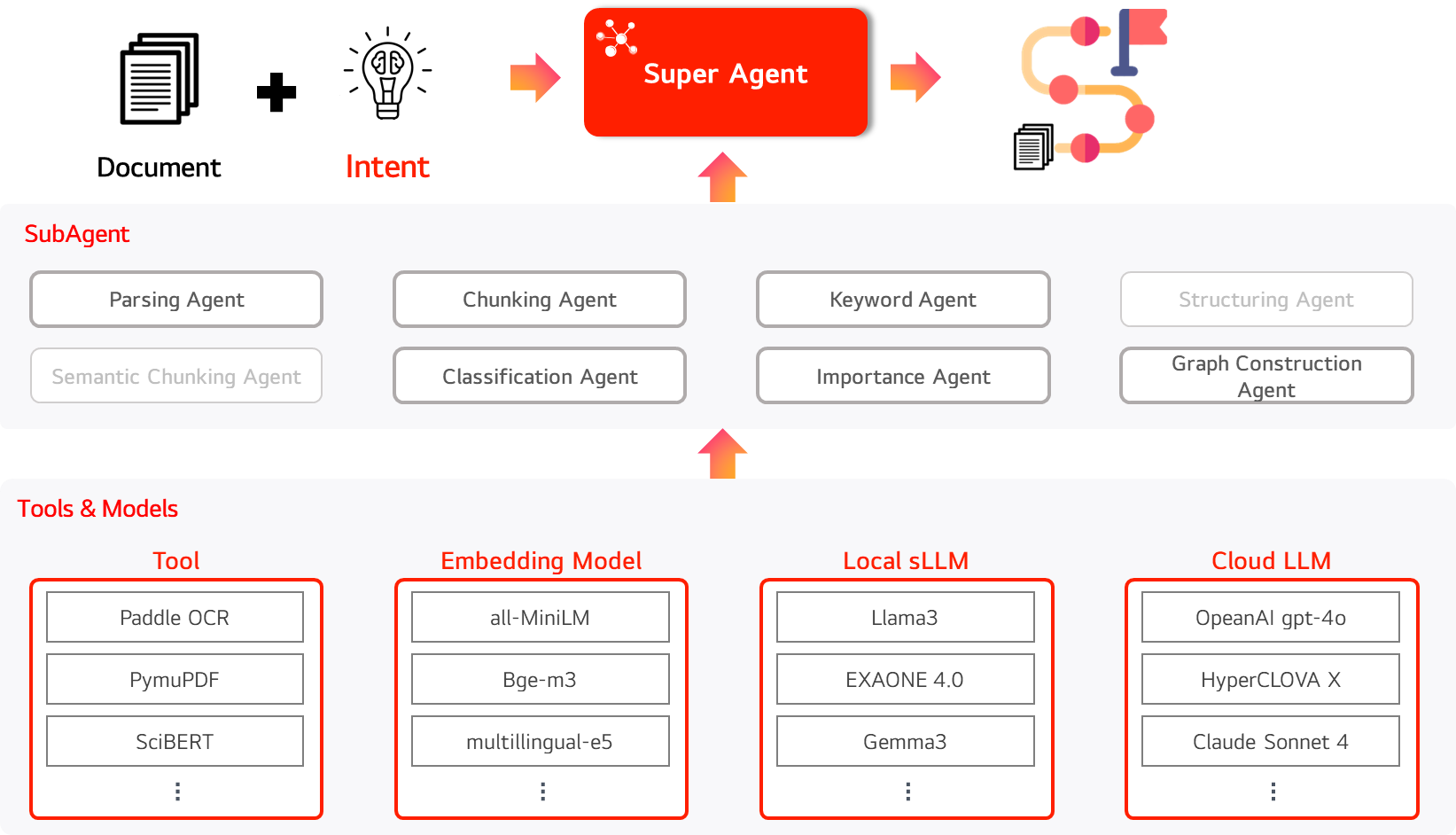
Highly specialized SubAgents in areas such as Parsing, Chunking, Embedding, Enhancement, Classification,
and Graph Construction collaborate to perform knowledge processing tasks. Each SubAgent comprehensively considers user intent and cost-effectiveness to
select the most suitable tools for their role, from lightweight local models to high-performance APIs.
By flexibly configuring according to user intent, such as downloading local models or integrating external APIs as needed, we maximize model quality and cost-effectiveness.
Various Services Based on Constructed Knowledge
Experience the most efficient knowledge utilization
Based on knowledge systems built according to intent, we provide various business services such as conversational chatbots, report generation, and insight discovery Agents.
Since all Agents share the same knowledge source (Single Source of Truth), consistency between services is maintained, and multiple tasks can be automated simultaneously with one knowledge system.
Legal chatbots provide accurate content and sources for each clause, market analysis Agents generate reports with insights analyzing relationships between multiple documents, and customer feedback analysis Agents present root causes of problems through sentiment classification and correlation analysis.
DocuMentor Service Differentiators
Innovation Beyond Existing RAG Services
| Category | Existing RAG Systems (Document-Centric) | DocuMentor (Intent-Centric) |
|---|---|---|
| Document Approach | "How do we process this document?" | "Why and how does the user want to use this document?" |
| Processing Starting Point | Document parsing and mechanical chunking | User intent analysis (purpose, key information, cost, etc.) |
| AI Model Usage | Single high-performance model applied uniformly (inefficient) | Automatic selection of optimal models according to user intent (simultaneous optimization of cost and quality) |
| Knowledge Structure | List of independent chunks | Knowledge system designed according to intent |
DocuMentor fundamentally solves the major limitations of existing RAG systems: uniform document processing methods and the cost-quality dilemma.
Beyond simple document processing, we provide value by understanding users' knowledge utilization purposes and strategically using AI as a tool to transform your documents into living knowledge.
Service Architecture
From Documents to AI Agents
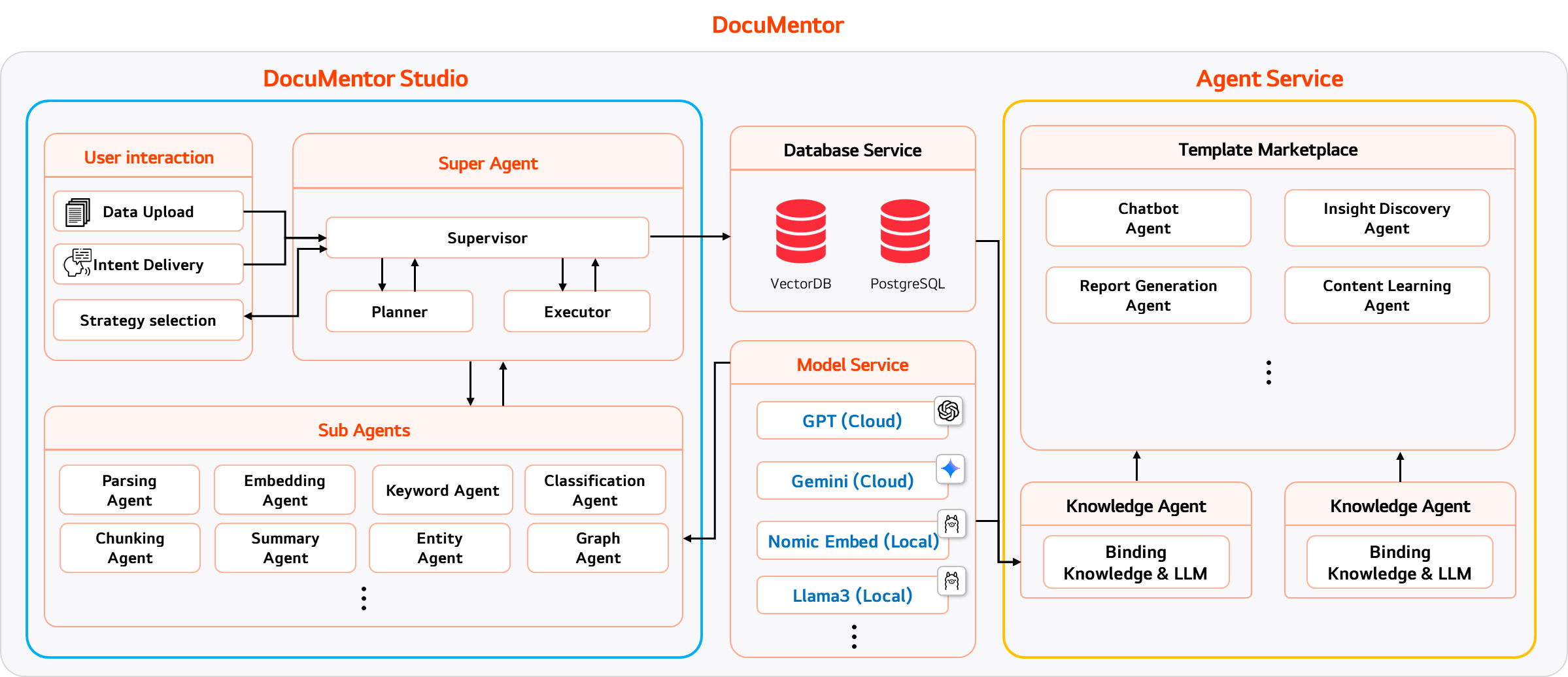
DocuMentor is a service that systematically converts documents into knowledge and helps create AI Agents based on this knowledge.
When you provide documents, the Intent Agent analyzes the content and proposes a knowledge system optimized for the user.
When users set goals based on the proposed knowledge system, the Intent Agent understands the user's intent and delivers it to the Super Agent.
The Super Agent comprehensively considers the user's intent, document content, and established strategies to select the most suitable Sub Agents and establishes an execution plan for systematizing knowledge.
If this plan aligns with the user's intent, it is immediately executed to build the knowledge system.
The constructed knowledge system can be widely utilized as knowledge-based Agent services by integrating with various Agent templates.
Experience continuously expanding AI services at optimal cost
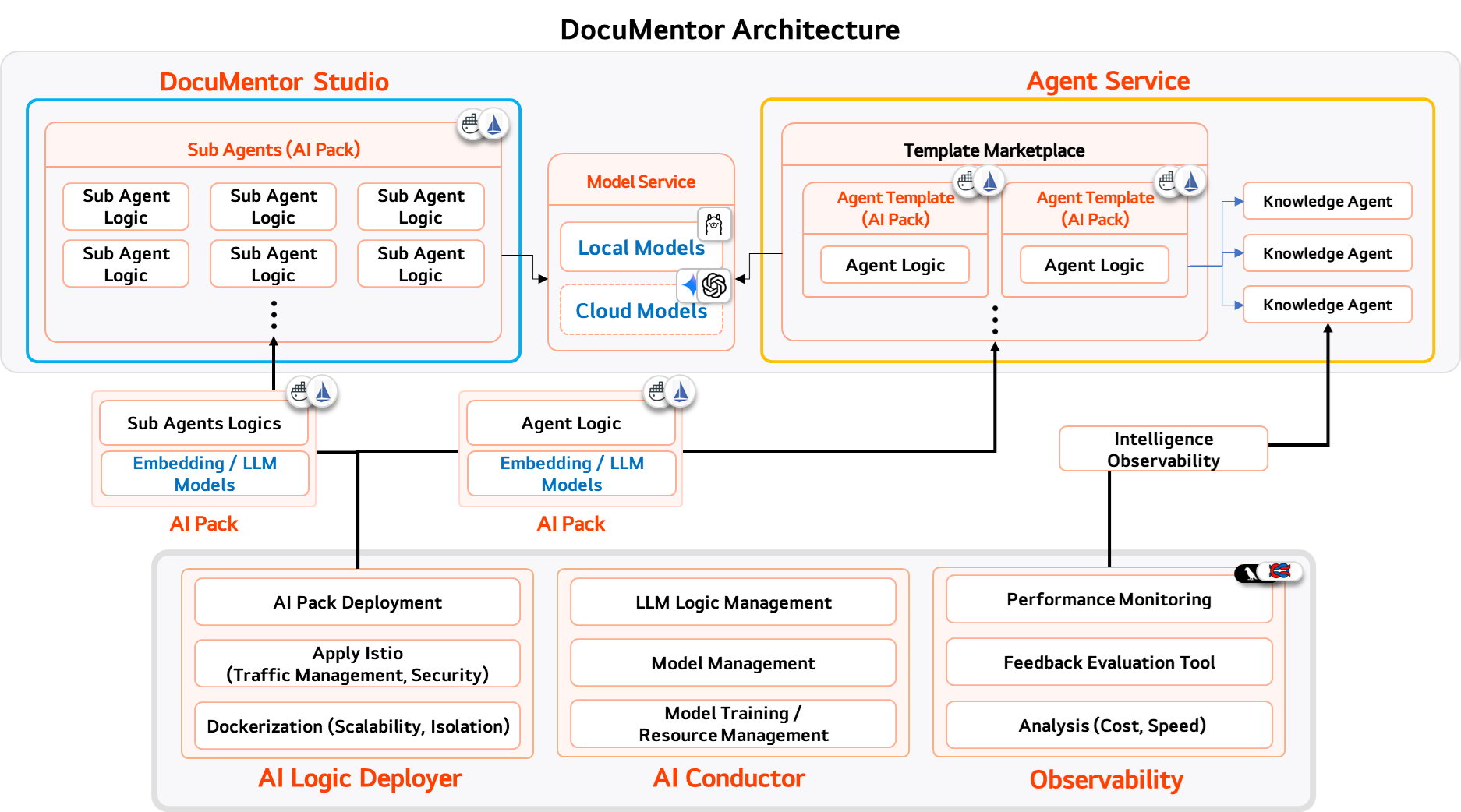
DocuMentor operates through LLMOps with an architecture that integrates various technologies of the Mellerikat platform.
Through the Mellerikat platform, we receive AI Pack deployments where Sub Agent logic is enhanced or new Sub Agents are added,
and provide each Sub Agent to operate with optimal models considering performance and cost.
Through the template marketplace, we provide new Agent templates to effectively utilize knowledge for various purposes,
and generated Agents can not only analyze knowledge utilization and performance through Observability but also receive intelligent services.
